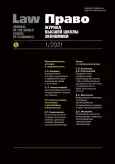Institutional Obstacles for Initiating a Criminal Case
- 作者: Kuptsov I.1
-
隶属关系:
- Constitutional and Administrative Law Chair, National Research University Higher School of Economics, Saint Petersburg branch
- 期: 卷 14, 编号 1 (2021)
- 页面: 107-129
- 栏目: Russian Law: Condition, Perspectives, Commentaries
- URL: https://journals.rcsi.science/2072-8166/article/view/318096
- DOI: https://doi.org/10.17323/2072-8166.2021.1.107.129
- ID: 318096
如何引用文章
全文:
详细
作者简介
Ivan Kuptsov
Constitutional and Administrative Law Chair, National Research University Higher School of Economics, Saint Petersburg branch
Email: kuptsov.ivan@gmail.com
Senior lecturer
参考
- Belyaev N.A., Shargorodskiy M.D. (1968) Course of Soviet criminal law. Vol. 1. Leningrad: University, 648 p. (in Russian)
- Boytsov A.I. (1995) Criminal law in time and space. Saint Petersburg: University, 257 p. (in Russian)
- Brainin Ya. M. (1967) Criminal law and its application. Moscow: Yuridicheskaya literatura, 240 p. (in Russian)
- Brizhak Z.I., Rozovskaya T.I. (2014) Criminal policy of state in taxation executed by the Prosecutory Commission of the Russian Federation. Rossiysky sledovatel, no 14, pp. 1617 (in Russian)
- Dikarev I.S. (2012) Initiating criminal cases on tax crimes. Nalogi, no 3, pp. 6-10 (in Russian)
- Golovko L.V. (2015) Alternative trends in criminal policy: Crime Control and Doing Business. Zakon, no 8, pp. 32-45 (in Russian)
- Kolokolov N.A. (ed.) (2012) Theory of criminal procedure: presumptions and prejudicies. Moscow: Yurlitinform, 492 p. (in Russian)
- Korobeev A.I. (2008) (ed.) Complete course of criminal law. Saint Petersburg: Yuridicheskiy tsentr press, 1133 p. (in Russian)
- Kropachyov N.M., Volzhenkin B.V., Orekhov V.V. (eds.) (2006) Criminal law of Russia. Saint Petersburg: University, 600 p. (in Russian)
- Lebedev V.M. (ed.) (2017) Commentaries to the Civil Code of the Russian Federation. SPS Konsultant Plus (in Russian)
- Mikheenkova M.A. (2013) Principle of autonomy of criminal law. Zakon, no 8, pp. 73-78 (in Russian)
- Shargorodskiy M.D. (1948) Course of criminal law. Moscow: Gosurizdat, 312 p. (in Russian)
- Sharipova A.R. (2013) Criminal law and procedural issues of initiating criminal cases on tax crimes. Pravo i gosudarstvo: teoriya i praktika, no 1, pp. 94-96 (in Russian)
- Smirnov G.K. (2013) Issues of improving state policy in counteracting tax crimes. Zakon, no 8, pp. 66-72 (in Russian)
- Smirnov G.K. (2013) Tax crimes: practice and prospects. Ugolovniy protsess, no 1, pp. 22-31 (in Russian)
- Stoyko N.G. (2015) Criminal and procedural policy of Russia: collection of essays. Saint Petersburg: TSPT Press, pp. 25-34 (in Russian)
- Trainin A.N. (1957) General theory of elements of crime. Moscow: Gosyurizdat, 363 p. (in Russian)
补充文件








